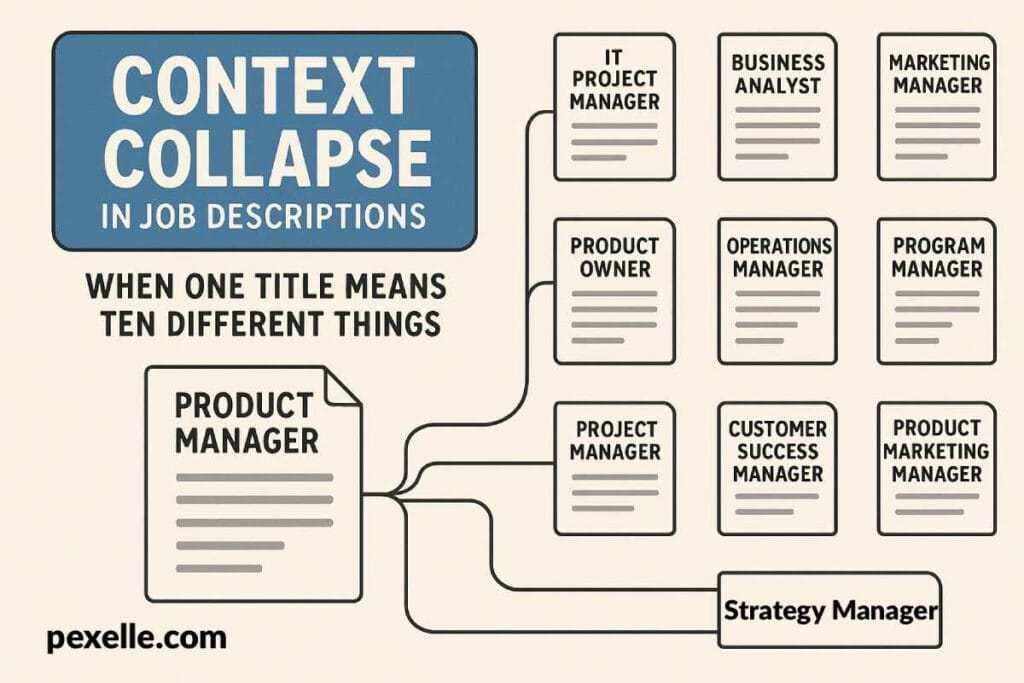Context Collapse in Job Descriptions: When One Title Means Ten Different Things

Introduction: The Illusion of Clarity
In theory, job titles are supposed to simplify communication. A “Project Manager,” “Data Analyst,” or “Software Engineer” should immediately give both employers and candidates a shared understanding of roles, expectations, and responsibilities. In practice, however, job titles often collapse under the weight of multiple contexts. The same title can mean vastly different things depending on the industry, company size, organizational culture, and even geography. This phenomenon—known as context collapse in job descriptions—creates confusion for job seekers, inefficiencies for recruiters, and mismatches for employers.
When One Title Masks Ten Roles
Consider the title “Project Manager.” In a tech startup, this person might handle product roadmaps, client communications, and even marketing coordination. In construction, the same title points to overseeing contractors, safety regulations, and budgets for multimillion-dollar projects. Meanwhile, in healthcare, a Project Manager might be tasked with compliance workflows and patient data transitions. Each use of the title carries its own responsibilities, tools, and performance metrics, yet the label remains the same.
This semantic flattening extends across industries. Titles like “Analyst,” “Coordinator,” “Engineer,” or “Designer” are especially prone to collapse. A “Data Analyst” in finance may focus on statistical modeling for investment risk, while in retail, the role might center on sales reporting and trend visualization. The danger lies in assuming that the job title alone is a reliable guide.
The Costs of Ambiguity
Context collapse has real consequences. For candidates, it leads to wasted time applying for positions that are either over- or under-qualified for their skill set. For employers, it inflates recruitment cycles and increases turnover when expectations don’t align with the hired individual’s strengths. On platforms like LinkedIn or Indeed, where algorithms filter candidates largely based on job titles, the mismatch becomes structural: people with very different skill sets get lumped into the same search category, while genuinely qualified individuals can get filtered out.
This ambiguity also has equity implications. Underrepresented groups in the workforce—who already face barriers in interpreting industry jargon—may be disproportionately disadvantaged when job descriptions lack clarity.
Why Context Collapse Happens
Several systemic factors fuel this problem:
- Industry Variability: The same function looks different across sectors (e.g., “Engineer” in civil vs. software).
- Company Size: Startups often expect employees to wear multiple hats, while corporations split functions into narrow specialties.
- Recruitment Marketing: Employers sometimes exaggerate or downplay responsibilities in titles to attract a wider pool of candidates.
- Evolving Skills: Emerging fields (AI, blockchain, climate tech) adopt existing labels but repurpose them for novel tasks.
Over time, these pressures stretch titles beyond recognition.
Toward a Skills-Based Future
A growing movement argues for replacing title-centric hiring with skills-based hiring. Instead of saying “We need a Business Analyst,” organizations can define the competencies they require: SQL proficiency, stakeholder communication, financial modeling, or data visualization. This shift reduces context collapse by anchoring roles in measurable skills rather than ambiguous titles.
Frameworks like ESCO (European Skills, Competences, and Occupations) and O*NET (U.S. Department of Labor’s database) are examples of attempts to standardize skills language across industries. Combined with AI-driven talent platforms, these systems aim to map real job postings to specific skill sets, helping to restore clarity in hiring.
Conclusion: Beyond the Label
Job titles will never fully disappear, nor should they. They serve as shorthand, cultural markers, and even status symbols. But relying on them as the primary way to define roles is increasingly unsustainable in a complex, fast-changing economy. The collapse of context in job descriptions is a signal: we need more precise, transparent, and skills-based approaches to describing work. Only then can we bridge the gap between “one title” and the “ten different things” it actually means.
Source : Medium.com




